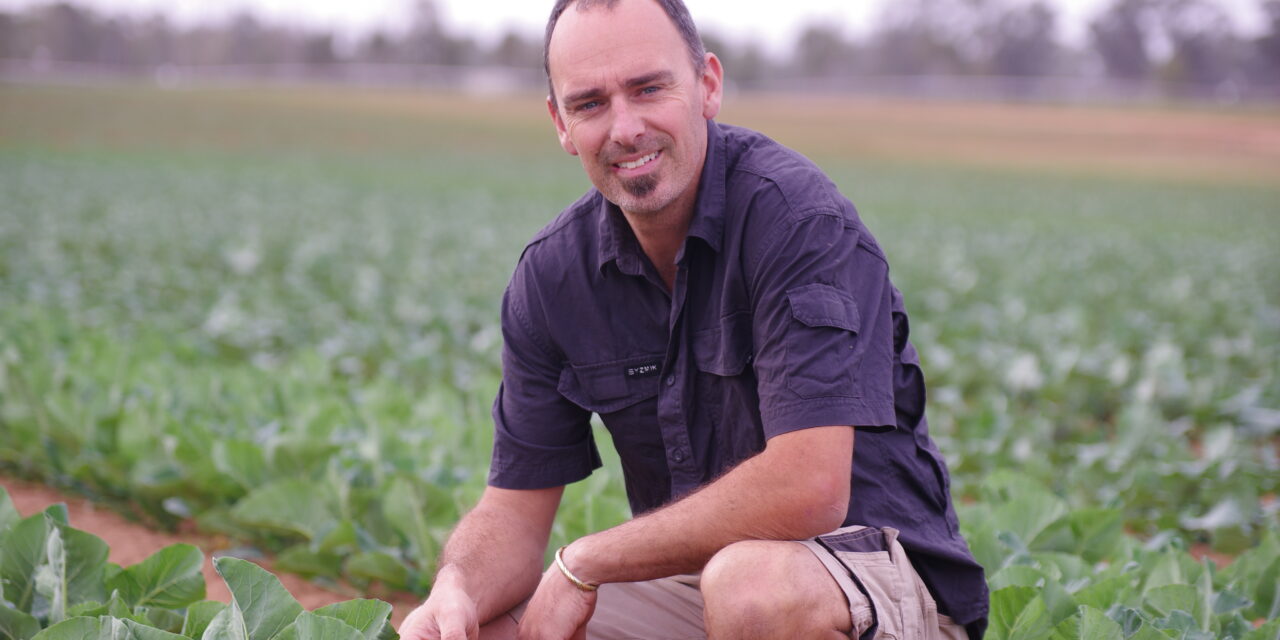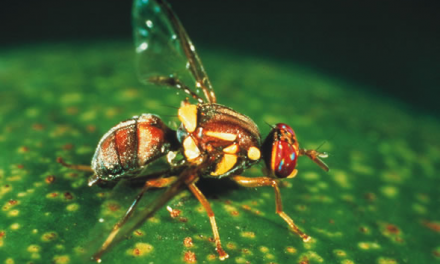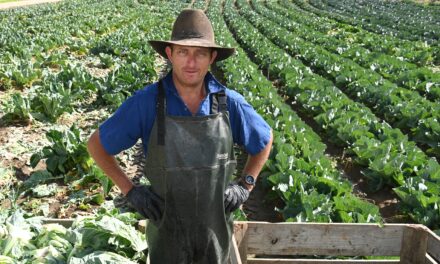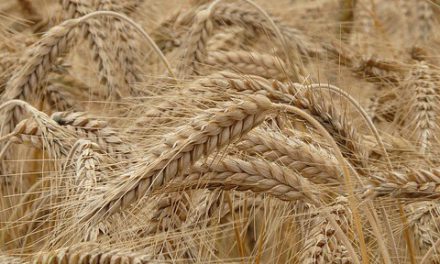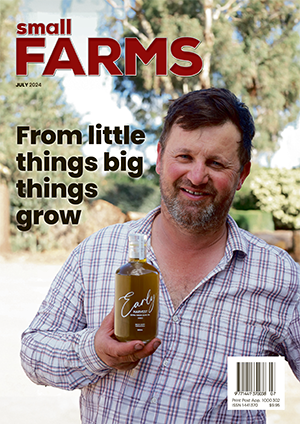The happy-ever-after ending for a vegetable growing family is turning into a fractured fairytale thanks to the overwhelming shortage of critically needed labour in the horticulture industry. But they’re not giving up without a fight — and so far they’re winning.
Wood Wood organic vegetable growers Adam and Kellie Farley have two sons — Tao, 11, and Nyran, 5 — and four foster children.
And while he knows he shouldn’t, Adam can’t help thinking he might just be able to get them out in the paddocks helping harvest the broccoli, celery, pumpkins and zucchini he is currently growing faster than he can harvest.
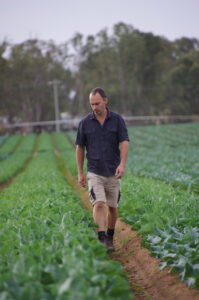
Because, like most of rural Australia, Adam’s enterprise has been devastated by the disappearing workforce.
He said he could recall when all the local caravan parks were overflowing, when he used to get one or more carloads of prospective pickers come down the drive every week looking for whatever work he had.
“I don’t reckon I’ve had a car down the drive for almost three years,” Adam said.
“In the past two months I’ve gone through 60 people trying to find some who would stay, and if they would stay if they could match the schedule we need to keep.
“Normally I have only ever needed the one labour contractor but now I am going to six of them and if I’m lucky that gives me the bare numbers I need to keep the place going.”
The labour crisis on top of COVID-19 and all its collateral damage has been giving the Farleys more sleepless nights than simple things such as drought or poor prices.
Since buying their 48 hectare property nine years ago (it was originally a vineyard) they have worked hard and taken some major financial risks to build it up.
Adam said initially, once he made the decision to go with organic vegetables, he was trying to do it all as a primarily one-man band, which limited him to 20ha. And he only managed that on the back of his itinerant workforce.
Today he has almost doubled the productive area — and it’s almost breaking his heart.
“Once the real challenge was what you put in the ground, and when, and how you grew it,” Adam reflected.
“Nowadays, growing the produce is the easy part, getting it harvested is make or break.
“It becomes a very vicious circle — you put the crops in, they ripen on time and then you find yourself going over-spec because you simply can’t get anyone to help harvest.
“With the acreage we have now I have had to add a full-time tractor driver to work alongside me.
“But we can’t do it all, and the supermarkets have their schedules and need your product when you told them it would be ready and when they have long factored it in.
“With zucchini, for example, if you go one day over-spec your product gets downgraded, and you start losing money.”
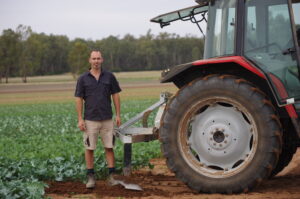
Adam has removed garlic and spring onions from his rotations as they are more labour intensive, and he simply couldn’t take the risk he could make that extra investment and get them picked on time.
In winter, the broccoli replaces the zucchini in the Farley paddocks and while Adam says you can probably go a couple of days over with those, the whole thing just snowballs from there and you simply get further behind.
“Right now our broccoli has fallen two to five weeks behind and I have been keeping them in the cool room to slow them down before planting but they can’t stay there much longer and I have more on the way.
“By comparison, we have had about 100mm of rain in the past month and normally that would be a really annoying setback for getting machinery onto paddocks.
“Our paddocks are set higher and our headlands lower, which means they have been flooded in this rain — with more to come. So we have been forced to pump them out so we can get the tractor into the fields.
“But by comparison with our labour problems, that’s almost nothing. It takes us a day or two to pump them out but that’s not helping get my broccoli planted or my other products harvested.
“At the moment I have been able to cobble together a roster of eight workers, four or five days a week, but it takes a certain approach to this industry where you need the skill set, the resilience and the technique so you are fast and not everyone can do that.”
Since he was a child, Adam has been immersed in horticulture.
His early days were spent on the farm with his mother, who grew herbs and edible flowers on Victoria’s Mornington Peninsula.
In his late teens, Adam embarked on a wide-ranging horticultural career, which after two decades, culminated with owning his own growing operation he branded Murray Valley Organics.
Before that he worked in growing operations around southern Victoria including Hussey and Co, Sunny Ridge Strawberry Farm and Gazzola Farms, plus two stints with Coolibah Herbs.
It was during Adam’s second stint with Coolibah Herbs that he and his family moved to northern Victoria after he accepted a job as farm manager at the company’s Wemen operation.
Adam managed the Wemen site for four years, and then left the operation to undertake dryland farming.
Over the following few months, Adam decided it was time to establish his own farming enterprise.
He purchased an old vineyard in Wood Wood, 35km north of Swan Hill, and Murray Valley Organics was born.
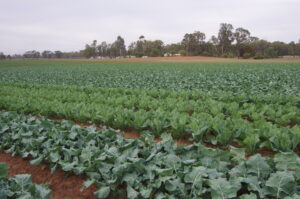 Establishing a business is never easy — especially when you’re on your own, as Adam explains.
Establishing a business is never easy — especially when you’re on your own, as Adam explains.
“The physical work that I’ve had to put in to get to where I am just now … I was exhausted, to tell you the truth. And I still know I’m not there.”
While he has always wanted to establish his own growing operation, Adam says there is a lot of pressure from working alone.
“Apart from the actual planting, growing, harvesting, to be that one-man band apart from having contract labourers to come in to do the harvesting for me, there’s also all the paperwork side of things at the end of the day — it certainly takes your time up.”
While Adam has to focus on implementing measures to ensure his business remains viable, he would also like to see the vegetable industry investigate production costs.
“I’d like to look at the costs that farmers face versus what we get for our produce, and who’s actually making the money.
“The biggest challenge is keeping the business viable. I know part of that is being a new business, but when you break it down and you look at all your input costs including water and labour, it’s a challenge.
“I’d like to look at the costs farmers face versus what we get for our produce, and who’s actually making the money.”
Adam says the decision to establish an organic growing operation was an easy one.
“Most places I’ve worked have been involved in conventional farming, but the more exposure organics has received recently really hit home. That’s what I wanted to do.
“I don’t believe there’s a need to be heavily reliant on artificial inputs. I’m not saying that the products aren’t good or are good — a lot of them probably are good, but it didn’t align with me.”
Adam believes both conventional and organic growers face the same demands, but it’s the way the issues are handled as they arise that is different.
“Conventional farming means you can use pretty well any practice you want as long as you’re within the guidelines.
“But with organic, you’ve got to think about everything you’re doing. It can come down to knowing your crops in your climate and being very preventative in what you do.
“We’re lucky in this very dry climate. I know a lot of other people in organic areas that are coastal and humid may suffer a lot more disease problems than what we would.
“Where we are is generally safe for what I grow. A rain event can drive humidity up and, in turn, disease pressures — but compared to southern Victoria, the disease pressure on crops is a lot less up here.
“But that’s not to say that they are not there.
“You definitely need to plan more and be more aware of what’s happening — you can’t just rely on the attitude of ‘this is what we’ve always done’, and you’ve got the chemicals to get you out of trouble.
“With organic farming, it’s a cliché, but you need to ‘look after your soil and it will look after you’.”
Adam takes precautionary measures based on the weather, including temperature, humidity and wind speeds, and he will act if necessary.
“I only sprayed twice last year for diseases and have had no disease problems on my farm. I was proud of that.
“I think it was due to inputs. I do a lot of fertigation and put a lot of seaweed and kelp into the ground.
“I’m a big believer in keeping the soil healthy and try to use a lot of those natural products to get the crops over the line.”
Adam has an agronomist come in every three weeks to do leaf tests and he fertigates according to those results. He has his soil tested annually and rolls out the seaweed and compost where and when necessary.
Adam’s biggest career achievement is establishing his own business in the current climate, but he is not looking too far into the future as he tries to secure long-term sustainability.
“I’m probably looking at introducing one or two more lines and was thinking I would work myself up to somewhere between eight to 10 crops to get me through the year.
“But now what I really need to get me through the year are those quality, experienced itinerant and seasonal workers.
“Only growing zucchinis during summer is a risk, especially if something went wrong with the crop.
“My ultimate goal is to secure customers for the summer and winter growing programs and cement consistency and established seasons — but we can’t do that on our own.”
Adam says the big step forward was his 2018 partnership with Rick Butler from Butler Market Gardens. Adam and Rick have been friends for more than 20 years, and the business connection has been a serious success.
“Rick gave us a start, and we grew some herbs for him to help fill a gap in the season. That now extends across our production schedule,” Adam said.
“His family is now in its third generation with this industry, and it works really well for us.
“Rick’s family has the packing and distribution systems, which I could never afford, and I supply them with quality year-round production, which is good for them.
“They have been big with the supermarkets since the 1970s, so they have all the contacts.”
Meanwhile, Adam’s exposure to many different growing operations throughout his career has had a positive impact on his new venture.
But the first major thing he has learnt over the past 20 years in horticulture?
“Don’t cut corners and do it properly the first time.”
And the second?
Probably scrap the theory that ‘if you grow it they will come’ because Adam really has a growing business, but no workers are coming down his drive.
– With Michelle DeLisle, AusVeg

